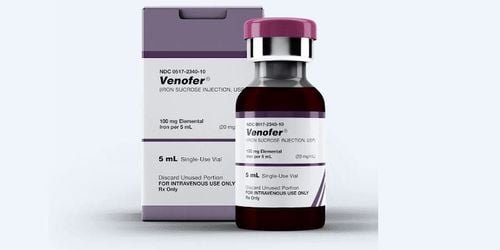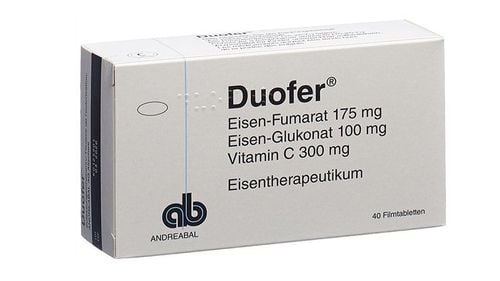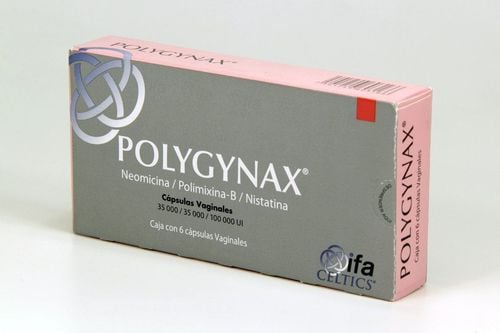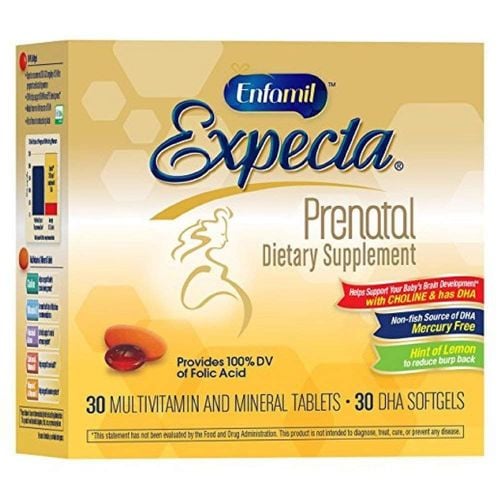This is an automatically translated article.
Ferate is an iron supplement used to treat or prevent low blood iron levels such as those caused by anemia or pregnancy. Iron is an important mineral that the body needs to produce red blood cells and keep you in good health.1. Indications and contraindications of the drug Ferate
Ferate drug is indicated for the following cases:Iron deficiency anemia Ferate drug is contraindicated in the following cases:
Iron metabolism disorders causing increased iron stores. Iron overload in the blood Hemolytic anemia Stomach ulcers Gastritis Ulcerative colitis Diverticulosis Disease Iron overload due to repeated blood transfusions
2. How to use Ferate
Follow all directions on the Ferate product packaging or take as directed by your doctor, do not take more than the recommended dose. If you have any questions about how to use Ferate, ask your doctor or pharmacist. Iron is best absorbed on an empty stomach, usually Ferate should be taken 1 hour before or 2 hours after a meal. If you have an upset stomach, you can take Ferate with food. Avoid taking antacids, dairy products, tea or coffee within 2 hours before or after taking Ferate as they will decrease its effectiveness. Take Ferate tablets or capsules with a full glass of water (8 ounces or 240 milliliters) unless otherwise directed by your doctor. Do not lie down for at least 10 minutes after taking the tablet or capsule. Swallow Ferate delayed-release capsules whole. Do not crush or chew slow-release capsules or tablets. Doing so could cause all of Ferate to be released at once, increasing the risk of side effects. Also, do not split the extended-release tablets unless they are marked and your doctor or pharmacist tells you to. If you are taking Ferate chewable tablets, chew the tablet thoroughly, then swallow. If you are taking the liquid suspension form of Ferate, shake the bottle well before each use. If you are taking the liquid form of Ferate for adults, carefully measure the dose using a special measuring device/spoon. Mix the dose in a glass of water or juice, and drink the mixture through a straw to prevent staining. If you are giving Ferate liquid to an infant or child, use the dropper provided to carefully measure the dose. The dose may be given directly into the mouth (towards the back of the tongue) or it may be mixed with formula (not milk), fruit juice, cereal, or other food as directed to increase potency. receptive ability. Take Ferate regularly to get the most benefit from it. To help you remember, take your medicine at the same time(s) each day. Tests such as a complete blood count may be done periodically to monitor your progress or check for side effects while using Ferate. Ferate is not a substitute for a proper diet. It is important that you maintain a balanced diet. Iron-rich foods include red meat (especially liver), fish, beans, dried fruit, iron-fortified cereals and breads.3. Side effects of the drug Ferate
While using Ferate, you may experience constipation, diarrhea, stomach cramps or abdominal pain. These side effects are usually temporary and may go away as your body adapts to the medication. If any of these side effects persist or get worse, contact your doctor or pharmacist right away.Iron can cause your stools to turn black, an effect that is not harmful to your health.
If your doctor has prescribed Ferate, remember that he or she has judged that the benefit to you outweighs the risk of side effects. Many people use this medication without any serious side effects.

Táo bón, phân đen là tác dụng phụ thường gặp khi dùng thuốc Ferate
Below are Ferate side effects by likelihood.
Common side effects of Ferate include:
Constipation Nausea Stomach bloating Diarrhea Black stools Uncommon side effects of Ferate include:
Vomiting Stomach upset Severe abdominal pain This is not a list. the full range of possible side effects of Ferate. If you notice other effects of Ferate not listed above, contact your doctor or pharmacist right away.
4. Measures to prevent side effects of the drug Ferate
Before taking Ferate, tell your doctor if you are allergic to this medicine and any other allergies you may have. Ferate products may contain inactive ingredients, and they may cause allergic reactions or other problems.Before taking Ferate, consult your doctor if you have: Iron overload disorder (e.g. hemoglobinopathy, hemosiderosis).
Before taking Ferate, tell your doctor your medical history, especially of: Alcohol use/abuse, liver problems, stomach/intestinal problems (such as stomach ulcers, colitis).
If your brand of iron supplement also contains folic acid, be sure to tell your doctor if you have a vitamin B12 deficiency (pernicious anemia) before taking it. Folic acid may falsify the results of some lab tests for vitamin B12 deficiency without actually treating the anemia.
Untreated vitamin B12 deficiency can lead to serious neurological problems (eg, peripheral neuropathy symptoms such as numbness/pain/tingling sensations).
Ferate chewable tablets may contain aspartame. If you have phenylketonuria (PKU) or any other condition that requires you to limit your absorption of aspartame (or phenylalanine), consult your doctor about safely using Ferate.
Liquid preparations of Ferate products may contain sugar and/or alcohol. Caution should be exercised when using this product if you have diabetes, alcoholism, or liver disease.
Women during pregnancy, should only use Ferate when absolutely necessary. Discuss the risks and benefits of the drug with your doctor. Ferate passes into breast milk, so women who are breastfeeding should consult their doctor before use.

Hãy tham khảo ý kiến của bác sĩ trước khi dùng thuốc Ferate
5. Ferate drug interactions
Your healthcare professionals may already be aware of any possible drug interactions with Ferate and may be monitoring you for them.Before taking Ferate, tell your doctor about all prescription and nonprescription/herbal medicines you may take, especially: Certain antibiotics (e.g. Penicillamine, chloramphenicol, quinolones such as ciprofloxacin/norfloxacin), bisphosphonates (eg, alendronate), levodopa, methyldopa, thyroid hormone replacement drugs (eg levothyroxine).
Avoid taking Ferate at the same time as antacids or tetracycline antibiotics. Wait at least 2 hours between taking Ferate and an antacid or tetracycline.
If your brand of iron medicine also contains folic acid, tell your doctor if you take certain anti-seizure medicines (for example, hydantoin such as phenytoin).
Ferate may affect the results of some tests, such as the fecal occult blood test, possibly causing false test results. Make sure laboratory staff and all your doctors know you are using Ferate.
6. What to do if you overdose or forget to use Ferate?
If you or someone else has overdosed on Ferate and has serious symptoms such as fainting or difficulty breathing, call 911. Symptoms of a Ferate overdose may include: Stomach pain, nausea, vomiting, diarrhea.If you are taking the Ferate product on schedule and miss a dose, take it as soon as you remember. If it is almost time for your next dose of Ferate, skip the missed dose. Use your next dose of Ferate at the usual time, do not double the usual dose.
7. How to store the drug Ferate
Store Ferate at room temperature between 59-86 degrees F (15-30 degrees C), away from light and moisture. Do not freeze liquid forms of Ferate. Do not store Ferate in the bathroom, keep it out of reach of children and pets.Do not flush Ferate down the toilet or down the drain unless directed to do so. Dispose of this product appropriately when it expires or is no longer needed.
Please dial HOTLINE for more information or register for an appointment HERE. Download MyVinmec app to make appointments faster and to manage your bookings easily.
Reference source: webmd.com












